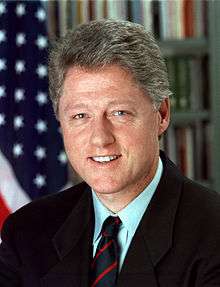Richard Riley
| Richard Riley | |
|---|---|
 | |
| 6th United States Secretary of Education | |
|
In office January 21, 1993 – January 20, 2001 | |
| President | Bill Clinton |
| Preceded by | Lamar Alexander |
| Succeeded by | Rod Paige |
| 111th Governor of South Carolina | |
|
In office January 10, 1979 – January 14, 1987 | |
| Lieutenant |
Nancy Stevenson Michael Daniel |
| Preceded by | James Edwards |
| Succeeded by | Carroll Campbell |
| Personal details | |
| Born |
Richard Wilson Riley January 2, 1933 Greenville, South Carolina, U.S. |
| Political party | Democratic |
| Spouse(s) | Ann Yarborough |
| Alma mater |
Furman University University of South Carolina, Columbia |
| Religion | Methodism |
| Military service | |
| Allegiance |
|
| Service/branch |
|
| Years of service | 1954–1955 |
Richard Wilson Riley (born January 2, 1933) is an American politician, the United States Secretary of Education under President Bill Clinton and the 111th Governor of South Carolina. He is a member of the Democratic Party. Riley is the only Democrat to serve two consecutive terms as Governor in the time since the state constitution was amended to allow Governors to serve consecutive terms.
Early life and career
Born on January 2, 1933 in Greenville, South Carolina, to Edward P. "Ted" Riley[1] and the former Martha (née Dixon) Riley. He attended Furman University and graduated from University of South Carolina.
Riley served in the South Carolina House of Representatives from 1963 to 1966. He served in the South Carolina Senate from 1967 to 1977.
Governor of South Carolina, 1979–1987
Riley was elected governor of South Carolina in 1978. During his first term, the state constitution was amended to allow governors to serve two terms. Riley was re-elected in 1982, 69-31 percent, over the Republican former journalist W. D. Workman, Jr., of Greenville, and served until 1987.
As Governor, Riley presided over the resumption of executions, despite his personal opposition to the death penalty.[2]
Riley's gubernatorial accomplishments centered upon improving funding and support for education and industrial recruitment. He named Max Heller, the mayor of Greenville who had lost the 1978 election for the United States House of Representatives from South Carolina's 4th congressional district to Republican Carroll A. Campbell, as the chairman of the South Carolina State Development Board. In this position, Heller recruited such businesses as Michelin North America and Digital Computer. State business recruitment under Heller surpassed $1 billion.[3] Heller pursued industrial diversification; during his five years as chairman of the development board, more than 65,000 jobs were created statewide.[4]
Post-gubernatorial career
In 1993, President Bill Clinton appointed Riley to his Cabinet as Secretary of Education. Riley served in this post until Clinton left office in 2001. Also in 1993, President Clinton approached Riley about an appointment to the United States Supreme Court, which Riley turned down. Clinton ultimately appointed Ruth Bader Ginsburg. Since then, he has served as a partner in the law firm of Nelson Mullins Riley & Scarborough, LLP, and served as a board member of the Albert Shanker Institute. On June 27, 2007 he endorsed Hillary Clinton for President and served as a Campaign Co-Chair.[5]
In 1999, Furman University, Riley's alma mater, created the Richard W. Riley Institute of Government, Politics and Public Leadership in his honor. In 2000, Riley received the Foreign Language Advocacy Award from the Northeast Conference on the Teaching of Foreign Languages in recognition of his support for education and especially for his repeated recommendations that all students learn a second language.[6] In 2008, Walden University renamed its college of education the Richard W. Riley College of Education and Leadership, in honor of Riley's "commitment to students, his legacy of improving access to higher education, and his focus on diversity in education."[7] Winthrop University also renamed its college of education after Riley in 2000.
World Justice Project
Riley serves as an Honorary Co-Chair for the World Justice Project. The World Justice Project works to lead a global, multidisciplinary effort to strengthen the Rule of Law for the development of communities of opportunity and equity.
Personal life
Riley and his wife, the former Ann O. Yarborough, have three sons and one daughter.
See also
References
- U.S. Department of Education Bio
- The Political Graveyard
- CNN AllPolitics – Players – Richard Riley
- Nelson, Mullins, Riley, and Scarborough Biography
- Richard W. Riley College of Education and Leadership
- The Riley Institute
- Furman University
- ↑ Edward P "Ted" Riley Papers, South Carolina Political Collections, University of South Carolina
- ↑ The best governor in America – and you've never heard of him. – Free Online Library
- ↑ "Katrina Daniel, A Tribute to Max Heller, August 1, 2011". Greenville Business Magazine. Retrieved May 20, 2014.
- ↑ "Max Heller Biography". Furman University. Retrieved May 20, 2014.
- ↑ http://campaignsandelections.com/sc/articles/?id=310
- ↑ "The James W. Dodge Foreign Language Advocate Award". Northeast Conference on the Teaching of Foreign Languages. Retrieved August 28, 2014.
- ↑ http://chronicle.com/news/article/3793/walden-u-names-a-college-after-former-secretary-of-education
External links
- SCIway Biography of Richard Wilson Riley
- NGA Biography of Richard Wilson Riley
- Past Winners of Harold W. McGraw, Jr. Prize in Education
- Richard Riley Interview NAMM Oral History Program (2013)
| Party political offices | ||
|---|---|---|
| Preceded by Bryan Dorn |
Democratic nominee for Governor of South Carolina 1978, 1982 |
Succeeded by Michael Daniel |
| Political offices | ||
| Preceded by James Edwards |
Governor of South Carolina 1979–1987 |
Succeeded by Carroll Campbell |
| Preceded by Lamar Alexander |
United States Secretary of Education 1993–2001 |
Succeeded by Rod Paige |


